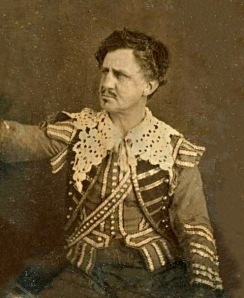Written by Ray Midgett of Washington, NC.
In 1822, a renowned actor, while making passage between Norfolk and Charleston, had a chance encounter with a fellow passenger. Perhaps while viewing the Cape Hatteras Light, the young thespian tells of his desire “to retire from public life and keep a lighthouse”.(1) By chance, the stranger happens to be one Thomas H. Blount, the Collector of Customs for the port of Washington, N.C. As Collector of Customs, he is responsible for the administration of the Cape Hatteras Lighthouse. Mr. Blount must have been impressed with the young actor because Blount eventually offers him the position of light keeper. The actor is Junius Brutus Booth, the Father of the yet to be born, John Wilkes Booth.
On May 1, 1796, Junius Booth, was born in London, England. He was the son of a lawyer. Early on he showed tremendous talent on the stage and became a celebrated performer throughout England. But by 1821, Booth had run away to the United States with a young woman, abandoning his wife and son and settled in a farmhouse near Bel Air, Maryland. Booth quickly became one of the most renown actors in America. Critic William Winter said, “He was followed as a marvel. Mention of his name stirred an enthusiasm no other could awaken.”(2)
Booth soon tired of the fame and pressure of acting, thus his desire for the simpler life. Quoting from his own memorandum describing his conversation with Mr. Blount, on board ship:
“Spoke to Mr. Blount, Collector of Customs, and one of the passengers, about Cape Hatteras Lighthouse. He offered it to me with the dwelling house, and twenty acres of land attached; and a salary of $300 per annum, for keeping the light, government providing oil and cotton, a quart of oil per diem. Grapes, watermelons, cabbages, potatoes, carrots, and onions grow in abundance there. Rain water the only drink; a cistern on the premises for that purpose. Abundance of fish and wild fowl; pigs, cows, and horses find good pasture. Soil too light for wheat or corn. Flour bought for four or five dollars a barrel. The office is for life, and only taken away through misbehavior. Lighthouse seventy-five feet high; light requires trimming every night at twelve o’clock. No taxes whatever. Firewood is procured from the pieces of wreck found on the shoals. One dollar per day is the charge for men who assist in cases of wreck. Strawberries, currant bushes, and apple trees should be taken there; also a plough, spades, and chest of carpenter tools. Pine tables the best. Mr. Blount is to write me word if the office can be given me in April next, from his seat in Washington, North Carolina.” (3)
History tells us Booth was not granted the position. His managers, not wanting to suffer the loss of revenue from their superstar client, managed to prevent his appointment. Thus Booth settled down for good in Maryland, where he raised his family. One can only image how different history might be if Junius had fulfilled his aspiration to be a Hatteras Lighthouse Keeper, and John Wilkes had been raised at the Cape.
1. The Elder and the Younger Booth, by Asia Frigga Clarke. Junius Brutus Booth pp. 63-64.
2. Wikipedia – Article on Junius Brutus Booth
3. The Elder and the Younger Booth, by Asia Frigga Clarke. Junius Brutus Booth pp. 63-64.

obxnative
April 1, 2012 at 7:13 pm
I love hearing pieces of history that you won’t find in textbooks. That’s awesome Dawn! Thanks for sharing!